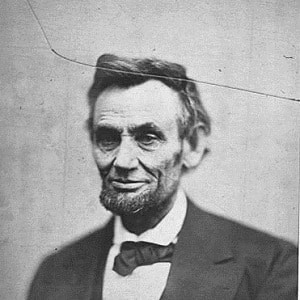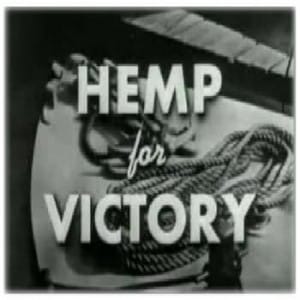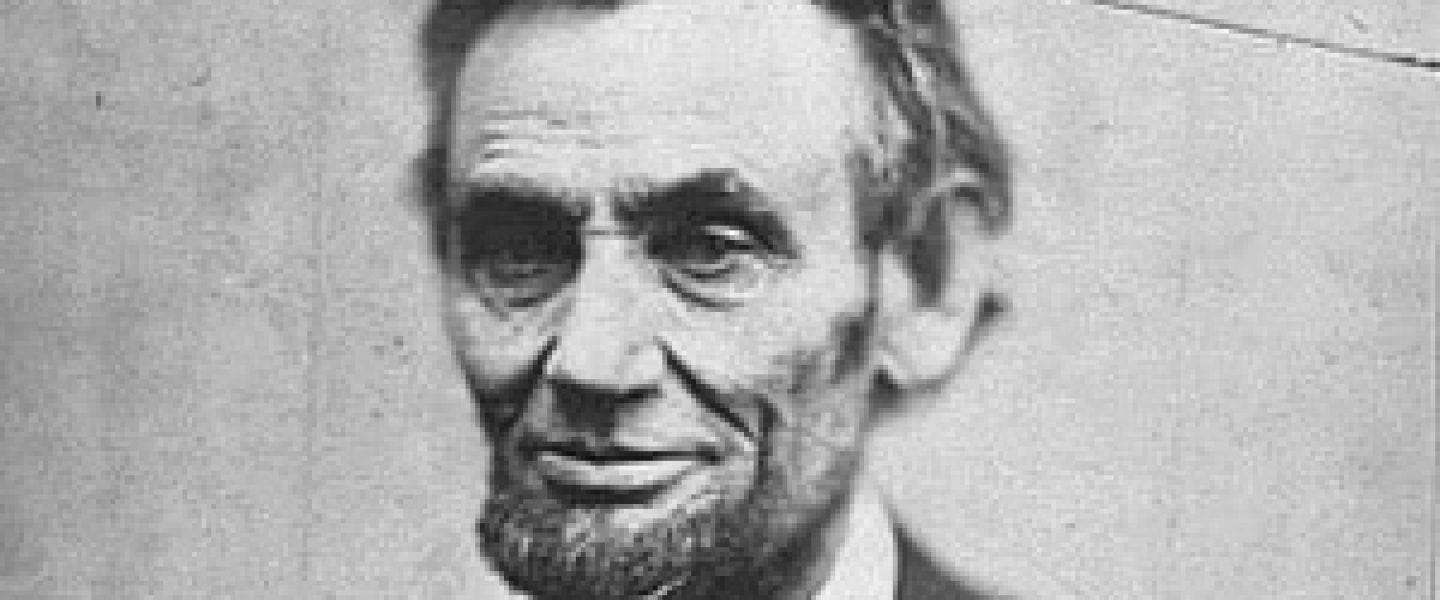
Update: National Public Radio reports that more books have been written about Abraham Lincoln than any other human who has ever lived—second only to Jesus Christ. More than 15,000 books have been penned about ol’ Abe. An impressive 35-foot high tower representing these numerous literary works is found at Ford’s Theater in Washington, D.C.
By George Rohrbacher, NORML Board member
Originally published April 11, 2008, ‘Abraham Lincoln, Hempster!’
When Abraham Lincoln, the Great Emancipator, first strode onto the public stage in 1832 and stepped into American History, he was wearing a pair of hemp pants.
From many points of view, Abraham Lincoln was America’s greatest President. Besides guiding America though the Civil War, the most troubled passage since our nation’s founding, he possessed the keenest intellect of anyone to have ever lived in the White House. He also possessed the greatest understanding of the life lived by the common man of anyone who had been or will ever be elected President. Abraham Lincoln came from the dirt, the death, the toil, and struggle of the American frontier.
He was born of the pioneer hordes that keep forever moving westward. A champion wrestler, Abe was the tallest, the strongest, the toughest, the fastest runner, the longest crowbar and maul-throwing man to ever sit in the Oval Office. Almost entirely self-educated, Abe had the benefit of only a total of four months of formal schooling. The stories of Lincoln walking twenty miles to return a borrowed book are true. He had a great fire burning within to learn–and as a teenager, had read all the books within a 50-mile radius of where his family lived in frontier Indiana. Dennis Hanks said of his cousin, “Seems to me I never seen Abe after he was twelve ‘at he didn’t have a book in his hands or pocket…It didn’t seem natural, nohow, to see a feller read like that.” Through hard work, determination, unbending honesty, and a deep well of talent, Abraham Lincoln rose to become the most revered man in all of American history.
 In Nineteenth Century America, social classes were set apart in many ways, their clothing was one of the most obvious. It was a time when the expression, “Clothing makes the man,” was still at full currency. Slaves, indentured servants, the pioneers living out on the frontier, the poorest of the poor, all wore a fabric called “tow-cloth”, and like a “tow-rope” it was woven out of hemp fibers. Tow-cloth was cheap and virtually indestructible. You could grow it and weave it yourself. Hemp had much longer, tougher, and courser fibers than flax. Flax was woven into the fabric called “linen”, and sometimes flax was blended with hemp to make tow-linen–though at times the term “tow-linen” was also used to give a fancy name to cheap goods (plain old tow-cloth) somewhat like how faux-suede or faux-fur is used today. Easy to grow in most climates, hemp resists pests, produces nutritious seeds, and has universally useful fibers. Josiah Henson (1798-1883) an escaped slave who won international fame and inspired Uncle Tom’s Cabin stated in his autobiography that for fellow slaves: “Our dress was tow-cloth; for the children nothing but a shirt; for the older ones a pair of pantaloons or gown in addition.” Tow-cloth, tow-linen, hemp cloth, different names for pretty much the same thing–and not only for slaves, but millions of America’s poor whites wore it as well.
In Nineteenth Century America, social classes were set apart in many ways, their clothing was one of the most obvious. It was a time when the expression, “Clothing makes the man,” was still at full currency. Slaves, indentured servants, the pioneers living out on the frontier, the poorest of the poor, all wore a fabric called “tow-cloth”, and like a “tow-rope” it was woven out of hemp fibers. Tow-cloth was cheap and virtually indestructible. You could grow it and weave it yourself. Hemp had much longer, tougher, and courser fibers than flax. Flax was woven into the fabric called “linen”, and sometimes flax was blended with hemp to make tow-linen–though at times the term “tow-linen” was also used to give a fancy name to cheap goods (plain old tow-cloth) somewhat like how faux-suede or faux-fur is used today. Easy to grow in most climates, hemp resists pests, produces nutritious seeds, and has universally useful fibers. Josiah Henson (1798-1883) an escaped slave who won international fame and inspired Uncle Tom’s Cabin stated in his autobiography that for fellow slaves: “Our dress was tow-cloth; for the children nothing but a shirt; for the older ones a pair of pantaloons or gown in addition.” Tow-cloth, tow-linen, hemp cloth, different names for pretty much the same thing–and not only for slaves, but millions of America’s poor whites wore it as well.
All the years Abe was growing up, the dirt poor Lincoln family wore tow-linen, home-grown hemp cloth they wove themselves. They were so poor that “Men and women went barefoot except in colder weather; women carried their shoes in their hands and put them on just before arrival at church meetings or at social parties.” his Dennis cousin Abe Lincoln; “In the early years he wore buckskin breeches and moccasins, a tow linen shirt and coonskin cap, ‘The way we all dressed in them days,’ said Dennis Hanks.” Hard cash money was very hard to come by on the frontier. Men’s wages were as low as $.25 per day, when there was work. Frontier people had to make do with what they could raise or catch. Dennis Hanks said it was a, “mighty interesting life fur a boy, but thar was a good many chances he wouldn’t live to grow up.” The pioneers made most of their own essentials for living, their log homes and hand-hewn furniture, their clothes that came from the animals they killed and skinned and the hemp and flax they grew, spun into thread, and wove into cloth. By the time Abe was eight, “The clerk was the only man he knew who was wearing store clothes, Sunday clothes, everyday of the week.”
It is an oft repeated, and even more often ignored, fact that the Declaration of Independence and the Constitution were written on hemp paper. Paper in the early days of America was made primarily from rags. Since the poor and the very poor constituted by far the largest percentage of the early American population, most of the rags available to be made into paper came off the backs of the poor were rags of tow-cloth or tow-linen. The other famous hemp-growing Presidents, Washington and Jefferson, grew hemp for cordage and to clothe their own field slaves.
Of all the thousands of biographies of Abraham Lincoln that have been written, there is one that stands out to me, the biography written by Carl Sandberg, the poet. Sandberg grew up in the Illinois prairie, talked to and lived among men and women who knew Lincoln. His six-volume biography of Lincoln took Sandberg a whole lifetime to complete. He received a Pulitzer Prize for it in 1939. The first volume, The Prairie Years, through Sandberg’s mastery of the English language, captures the feel of the American frontier life as very few books ever have. It is from Sandberg’s Lincoln that I am quoting in this blog.
Lincoln was in attendance when, “The boys were having a jollification after an election. They had a large fire made out of shavings and hemp stalks; and some of the boys bet a fellow I shall call ‘Ike,’ that he couldn’t run his bobtail pony through the fire.” The pony had more sense than its rider and slammed on the breaks at the very last second, “and pitched poor Ike into the flames.” Lincoln saved him. You can be sure that the boys and Ike were drunk on corn squeezings, or somesuch, not high on hemp fumes, because the varieties of hemp grown for fiber contain less than .03% of the active ingredients for which its brother marijuana is world-famous. Today law enforcement in Kentucky, Indiana, and Illinois annually wastes significant time and resources each year gathering and destroying millions of wild hemp plants to puff-up their drug enforcement statistics. This “ditchweed,” this non-psychoactive feral hemp, mid-west law enforcement has been chasing for years, like a dog chasing its own tail, might very well have escaped into the wild from one of Tom Lincoln’s several farms in those states, between 1810 and 1830, when hemp was grown and worn the Lincoln family to protect American History’s most important person from the elements.
 Elections were to become a big factor in the rest of Abraham Lincoln’s life, both those he lost as well as those he won. Abe volunteered at the outbreak of the Black Hawk War and was elected Captain by his men. Upon returning home from that campaign, Abe ran for public office for the very first time. When he first ran to try to become a state representative, he ran wearing a pair of hemp pants. “Lincoln started electioneering and kept it up till the ballots were counted. He traveled over Sangamon County with his long frame wrapped in flax and tow-linen pantaloons, a mixed jean coat, clawhammer style, short in the sleeves, and bobtail,” When the results were all in, Lincoln had lost his first election, coming in eighth among thirteen contenders. But, from the voters in his home district, Abe had received an astonishing 277 out of the 300 votes cast! Our man in hemp pants had a big future in politics.
Elections were to become a big factor in the rest of Abraham Lincoln’s life, both those he lost as well as those he won. Abe volunteered at the outbreak of the Black Hawk War and was elected Captain by his men. Upon returning home from that campaign, Abe ran for public office for the very first time. When he first ran to try to become a state representative, he ran wearing a pair of hemp pants. “Lincoln started electioneering and kept it up till the ballots were counted. He traveled over Sangamon County with his long frame wrapped in flax and tow-linen pantaloons, a mixed jean coat, clawhammer style, short in the sleeves, and bobtail,” When the results were all in, Lincoln had lost his first election, coming in eighth among thirteen contenders. But, from the voters in his home district, Abe had received an astonishing 277 out of the 300 votes cast! Our man in hemp pants had a big future in politics.
Next, Lincoln hunkered down as a clerk in New Salem, Illinois and studied the law. “At one time, while storekeeping, he slept on the counter of the store because the Rutledge Tavern was overcrowded. He wore flax and tow-linen pantaloons, no vest, no coat, and one suspender, a calico shirt, tan brogans, blue yarns socks, and a straw hat bound round with on string or band.” These flax and tow-linen pantaloons could be the very same pair of pants mentioned earlier when Abe first ran unsuccessfully for election. Hemp cloth, as tough as it is, probably hadn’t worn out yet.
Abe won the election the next time he ran for state representative. But even after he’d become a member of the Illinois state legislature and a lawyer, Lincoln’s material station in life hadn’t changed very much. As described by a colleague, Abe, “He was poverty itself, but independent.” But Lincoln was now in position; he was ready now to make his mark in history, and to make it when slavery had become the dominant issue. As he said later, “I am naturally anti-slavery. If slavery is not wrong, nothing is wrong. I cannot remember when I did not feel this way.” At the very end of his first term in the Illinois state legislature Abe and one other member introduced a resolution protesting resolutions supporting slavery stating, “They believe that the institution of slavery is founded on both injustice and bad policy.” This humble man from the backwoods had taken his first public stand on slavery, the most important and divisive issue that has ever confronted America. It started a path for an honest man in hemp pants that he would walk unfailingly to its end, a path that would make him immortal.
Quotes from Carl Sandberg, © 1924 Lincoln The Prairie Years and Carl Sandberg, © 1954 Lincoln The Prairie Years and the War Years one volume edition.
Abraham Lincoln was fatally shot in Ford’s Theater the evening of April 14, 1865. He died the next morning. Secretary of War Edwin Stanton said, at Lincoln’s passing, “Now, his is one for the ages.” There was a white banner trimmed in black hung over Broadway in New York City, it read, “The great person, the great man, is a miracle of history.”
Support and contribute to NORML, an organization created for and supported by cannabis consumers.






